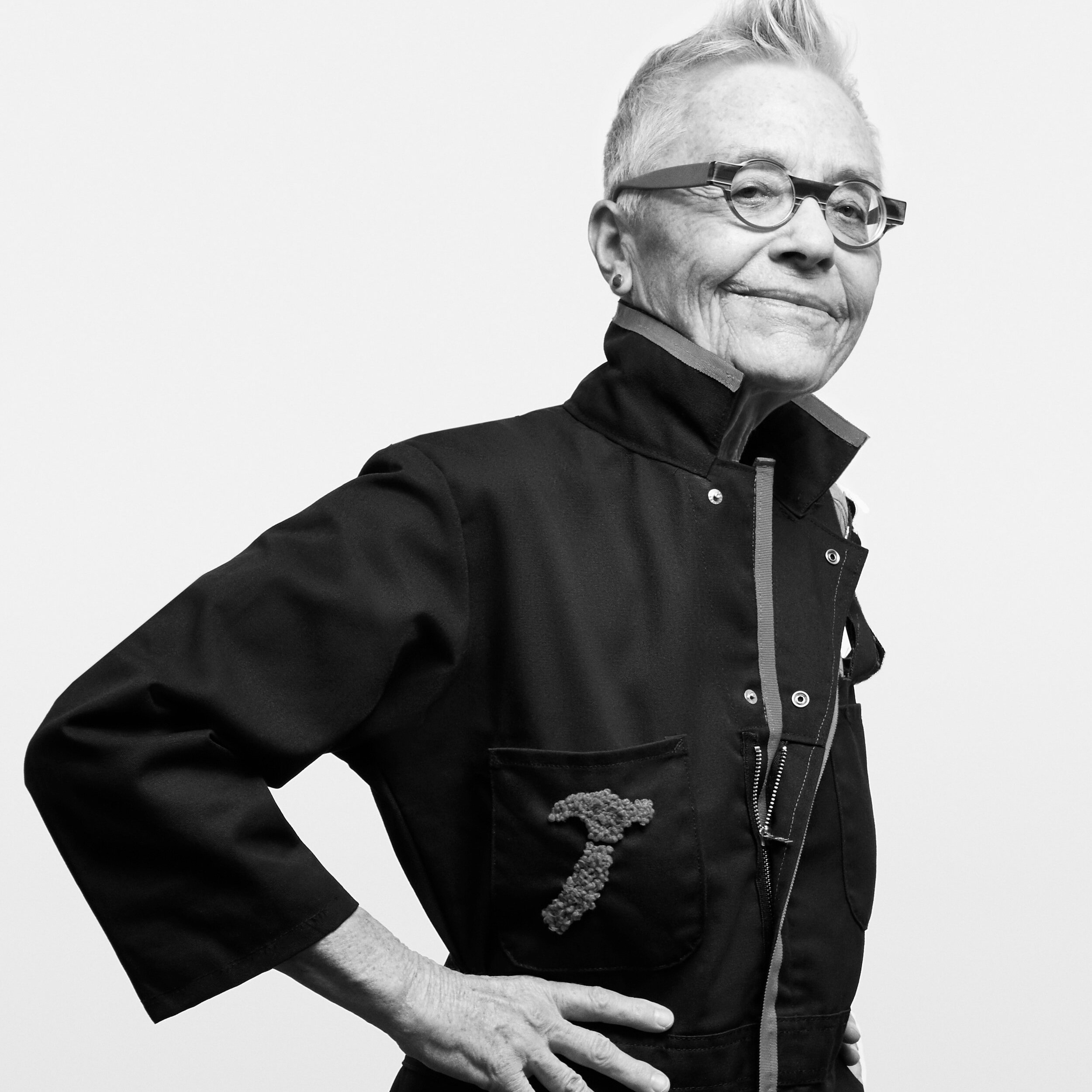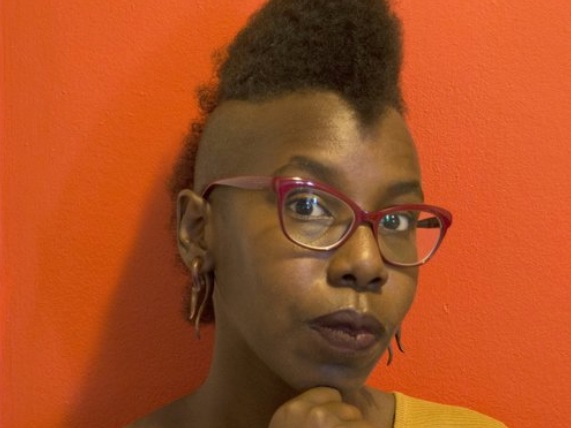The Barbara Hammer Lesbian Experimental Filmmaking Grant is an annual grant that will be awarded to self-identified lesbians for making visionary moving-image art.
“It has been the goal of my life to put a lesbian lifestyle on the screen. Why? Because when I started I couldn’t find any! ...I picked up a camera in the 60s, late 60s, made Super 8, 8mm, finally went to school and got a 16mm camera. Made 13 films in two and a half years. All experimental. Because I think that as a lesbian at that time I was living an experimental lifestyle. Well let’s just say, I was experimenting. And I still am. And I think that lesbian film really calls out for experimental work. ...Working as a lesbian filmmaker in the 70s wasn’t easy in the social structure — the educational institution that I was in. It was difficult. And I want this grant to make it easier for lesbians of today. So you can make work that you want to make.”
— Barbara Hammer
ABOUT
The Barbara Hammer Lesbian Experimental Filmmaking Grant is an annual grant awarded to self-identified lesbians for making visionary moving-image art. Work can be experimental animation, experimental documentary, experimental narrative, cross-genre, or solely experimental. Applicants must be based in the U.S. This grant was established by Hammer in 2017 to give needed support to moving-image art made by lesbians. The grant is supported directly by funds provided by Hammer’s estate and administered through Queer|Art by lesbians for lesbians, with a rotating panel of judges. The grant includes an award of $7,000.
Applications for the Barbara Hammer Lesbian Experimental Filmmaking Grant were open November 1st through January 24th.
DESIREENA ALMORADIE AND BARBARA MALARAN WIN FIFTH ANNUAL BARBARA HAMMER LESBIAN EXPERIMENTAL FILMMAKING GRANT
Top: Desireena Almoradie; Bottom: Barbara Malaran.
Queer|Art is excited to announce the winners of the 2021 Barbara Hammer Lesbian Experimental Filmmaking Grant, collaborative duo, Desireena Almoradie and Barbara Malaran. The New York-based filmmakers will receive a $7,000 cash grant, as well as studio visits with members of the judging panel in support of their creative and professional development.
Almoradie and Malaran were selected among 108 applicants who applied for the Hammer Grant in its fifth year, winning for a project currently titled Untitled Kilawin Documentary. Set in the 1990s, against the backdrop of fierce patriarchy, racism, and lesbophobia, the film documents the revolutionary convergence of lesbian Filipinas who gathered for the first time in New York City to establish a loving, safe, and affirming community.
This film will trace the history of Kilawin Kolektibo, a pioneering collective of lesbian and queer brown women who came together in NYC in the mid-nineties. Culling from a treasure trove of over 25 years worth of historic documentation, the film will tell the story of queer Filipinxs who were searching for a community–a place where they could not only be open about their sexuality but also about their Filipinx culture.
The collaborative duo notes that as filmmaking members of Kilawin Kolektibo back in the 90’s and early 2000’s, they drew inspiration from Barbara Hammer’s playful and irreverent films and were encouraged by her warm and open personality. Malaran was Hammer’s student at the Media Studies Program of the New School, and now many years later, the duo states, “it feels so appropriate and we are so very grateful to be receiving the Barbara Hammer Grant for Lesbian Experimental Filmmaking. The grant will allow us to devote much needed time to concentrate on bringing our experimental documentary to a fine cut.”
“I am so excited to see this film,” remarks 2021 Hammer Grant judge Amber Bemak. Bemak noted that the duo was the clear winner of the Barbara Hammer grant: “the project is an important part of queer history which will be executed in a aesthetically and formally innovative way.”
Untitled Kilawan Documentary (2021) work-in-progress clip
2021 BARBARA HAMMER GRANT FINALISTS
2021 HAMMER GRANT JUDGES
Amber Bemak currently lives in Dallas, Texas after three years spent living in Mexico City after seven years living as a traveling filmmaker between India and Nepal. She is a filmmaker, artist, and educator whose work is based in experimental and documentary film. For the past two decades, she has been engaged in a multi-layered exploration of performance and film which uses the body as a sight for socio-political inquiry, engages with text, language, and translation to open up discourse around deeply embedded colonization narratives, and commits to linking the intimate and personal with larger institutional structures. Her work has been seen at venues including the Brooklyn Museum, the Rubin Museum of Art, SculptureCenter, the Schwules Museum, and the Tamayo Museum. Festivals include Oberhausen, BAM cinemafest, Sheffield Docfest, Ann Arbor, DocLisboa, Morelia, and the European Media Art Festival. She has taught film theory and practice in India, Nepal, Kenya, Mexico, and the United States.
Suzy Halajian is an independent curator, writer, and researcher based in Los Angeles. Her work begins at the intersection of art and politics, treating image making as steeped in colonial pasts and modern surveillance states with a focus on the Middle East, North Africa and their diaspora. She has recently curated exhibitions and programs at LACE, ONE Archives at the USC Libraries, Hammer Museum, Human Resources, Los Angeles Contemporary Archive (all Los Angeles); Disjecta, Portland; Sursock Museum, Beirut; and UKS, Oslo. Halajian is Associate Curator at Kunstverein Amsterdam and serves on the Programming Committee of Human Resources Los Angeles. She has written for numerous publications and is currently co-editor of Georgia journal which she co-founded with Anthony Carfello and Shoghig Halajian. Halajian holds an MA in Curatorial Studies from Bard College, New York, and is currently a doctorate student in the Film and Digital Media program at the University of California, Santa Cruz.
Aily Tanaka Nash is a curator and educator based in New York. She is a programmer at the New York Film Festival, where she co-curated the Projections section from 2014–2019, and is currently head of short films and on the selection committee for the Currents section. She is a program advisor to the International Film Festival Rotterdam’s Short Film section. She served as a Biennial advisor and co-curator of the film program for the 2017 Whitney Biennial, and was Head of Programming for the 2018 Images Festival in Toronto. She curated the Basilica Screenings series at Basilica Hudson of Music (New York), Anthology Film Archives (New York), SAIC’s Sullivan Galleries (Chicago), REDCAT (Los Angeles), Institute of Contemporary Art (London), Kiasma Museum of Contemporary Art (Helsinki), Tabakalera Centre for Contemporary Culture (San Sebastian), Doc’s Kingdom (Portugal), FACT (Liverpool), Tokyo Photographic Art Museum (Tokyo), Ghost:2561 (Bangkok) and others. In 2015, she was awarded a Curatorial Fellowship from the Andy Warhol Foundation. In 2018, she had a MOBIUS Curatorial Fellowship with the Finnish Cultural Institute New York, and commissioned new works by artists James N. Kienitz Wilkins and Lucy Raven in partnership with PUBLICS and Heureka, Finnish Science Center. She has taught at CalArts, Dartmouth, Bard Microcollege, and Cooper Union.
ABOUT BARBARA HAMMER
Barbara Hammer (1939-2019) began making films in the 1970s. She is most well-known for making the first explicit lesbian film in 1974, Dyketactics, and for her trilogy of documentary film essays on queer history: Nitrate Kisses (1992), Tender Fictions (1995), and History Lessons (2000). Her cinema is multi-leveled and engages audiences viscerally and intellectually with the goal of activating them to make social change, often through an exploration of the materiality of the filmmaking process and its relationship to the body’s potential as subject, form, author, and screen. She has been honored with seven retrospectives, including a forthcoming exhibition later this year at the Wexner Center for the Arts in Columbus, Ohio. Previous retrospectives took place at The Museum of Modern Art in New York City, Tate Modern in London, Jeu de Paume in Paris, the Toronto International Film Festival, Kunsthalle Oslo in Norway, and The Leslie Lohman Museum of Gay and Lesbian Art in New York City. Her book Hammer! Making Movies Out of Sex and Life was published in 2010 by The Feminist Press at The City University of New York.
MEET OUR GRANT MANAGER
Vanessa Haroutunian (they/she) is a queer producer, artist, and curator. She received her B.A. in Film & Electronic Arts from Bard College, and received the Jerome B. Hill Award for Documentary Excellence for their thesis film. Haroutunian recently produced three short films written and directed by queer female identified filmmakers: Erin Greenwell, whose debut feature My Best Day premiered at the Sundance Film Festival, Heather María Ács, whose short film Flu$h screened at Outfest and Newfest, and Ariel Mahler whose short trans-thriller Flock is currently being developed into a feature with Haroutunian attached to produce. Ács and Haroutunian’s short film Flourish premiered at Outfest Fusion LGBTQ People of Color Film Festival and was selected for Outfest’s “United in Pride” Festival in 2020. Haroutunian is currently in post-production on a feature documentary, shot over 20 years, about the LGBTQ+ community in Cuba, and a short film entitled Blue starring two transgender leads that has been supported by InsideOut’s Re:Focus Fund. Haroutunian’s goal is to produce films that fill the gaps in the film industry, creating opportunities for diversity, inclusivity, and intersectionality in front of and behind the camera. From 2013-2018 they were the Programs & Operations Coordinator at Queer|Art, where they currently manage the Barbara Hammer Lesbian Experimental Filmmaking Grant. Haroutunian has curated a moving image program in conjunction with the Hammer Grant since its inception and in 2019 the program entitled “The Hammer Mix: Decades'' screened at the Museum of Modern Art (MoMA).
















